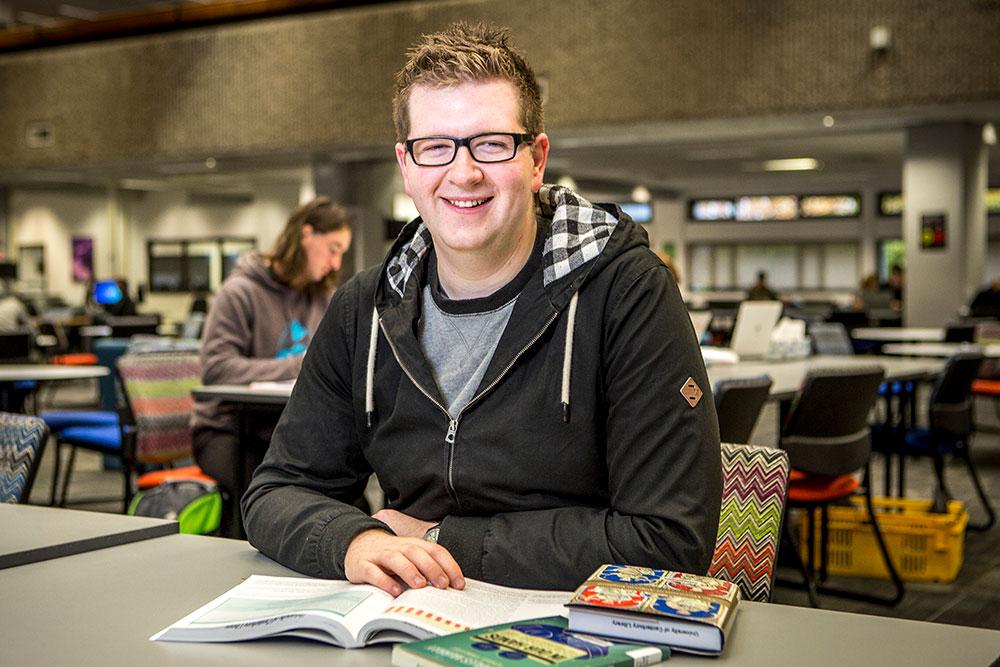Psychology is the scientific study of behaviour and associated biological, cognitive and social processes in humans and other animals. It is a rapidly developing field touching on all aspects of human life. Advances in neuroimaging and molecular biology are rapidly enhancing our understanding of how the brain works, while more and more complex theories are being developed to understand both normal and abnormal development and the behaviour of individuals and groups. Major advances are being made in understanding and treating psychopathologies such as anxiety, depression, eating disorders and addictions.
Through their Psychology degree, graduates gain a valuable set of transferable skills such as:
- Independent and innovative thinking
- Critical analysis of psychological issues
- Ability to apply methods, findings and theories
- Ability to distinguish genuine findings from implausible claims
- Understanding and valuing diversity
- Designing and conducting research
- Evaluating various sources of information
- Problem solving
- Oral and written communication
- Cooperation, teamwork and leadership
- Statistical and computer competencies.
Applied learning opportunities are available such as laboratory sessions, fieldtrips and internships. These experiences deepen your skillset, awareness of others, working knowledge and employability.
Without specified higher qualifications, graduates with a bachelor’s degree in Psychology do not work professionally as psychologists. Many enter other careers that benefit from relevant skills, such as human resources or marketing.
Registered psychologists work in a number of health, social services, corrections, specialist, charitable, government and research contexts. An increasing number work in private practice.
UC Psychology graduates have been employed in:
- Government organisations eg, Department of Corrections, Oranga Tamariki Ministry for Vulnerable Children, Ministry of Social Development, NZ Police, the NZ Defence Force
- District health boards eg, Northland, Bay of Plenty, Capital and Coast, Canterbury District, Nelson Marlborough, Southern Health Boards • Recruitment companies eg, Sheffield, Hudson, Madison Recruitment, Manpower Group, Sourced Ltd, Brannigans Human Capital, M&T Resources, Charterhouse Resources, Randstad
- Not-for-profits eg, Barnados, Stepping Stone Trust, Salvation Army, Emerge Aotearoa, Pukeko Blue Ltd, Pathways, World Vision
- Advisory services and helplines eg, Youthline, ADANZ Alcohol and Drug Helpline
- Regional government eg, Christchurch City Council, Environment Canterbury
- Education eg, universities, technology institutes, English language, primary or secondary schools
- Research eg, New Zealand Brain Research Institute, Focus Research, Connected Group, EJ Legal, Research New Zealand
- Private companies eg, Weta Workshop, AECOM, Downer NZ, Accenture, Airways NZ, Sovereign Insurance, Deloitte, American Express.
Graduates with this degree are employed in a range of jobs from intern psychologist to policy analyst — see some examples below.
Note: Some of the jobs listed may require further study at postgraduate level (those marked with an * require this). See also ‘Further study’ on this page.
Human resources / recruitment officer
- Advertises vacancies and recruits staff
- Advises on workplace policies and procedures
- May oversee staff development, health and safety, pay and reward etc.
Clinical psychologist*
- Administers psychometric tests, conducts interviews and observes interactions
- Assesses and reports on a client’s personality, behaviour, strengths, weaknesses and needs
- Provides therapy or treatment to effect positive change and monitors progress
- Runs group therapy, workshops and courses
- Works alongside other professionals eg, doctors
Social / youth / support / case worker
- Provides support and guidance to young people, individuals and whānau
- Builds relationships and links people to resources, services, groups and events
- Develops programmes to address local issues
- Writes reports and coordinates budgets
Organisational psychologist / HR consultant*
- Designs and initiates workplace improvements
- Offers expertise eg, on staff selection, safety, training, appraisal, industrial relations, culture
- Advises career counsellors and organisations
Mental health professional
- Builds relationships with people experiencing mental health difficulties
- Assesses their needs, supervises progress
- Aids independence and intervenes if needed
Social policy researcher
- Researches social issues eg, housing or poverty
- Assists with family therapy or community development initiatives
Child and family psychologist*
- Assesses children and adolescents, and works with their whānau
- Provides therapy or treatment and monitors progress
- Works alongside other professionals eg, teachers, social workers, counsellors
Research analyst / assistant
- Organises and conducts research
- Tests theories and interprets the results
- Writes reports and makes recommendations
Health promoter
- Identifies health concerns and needs for a range of groups
- Develops strategies to motivate and help people manage their health
- Assists government and organisations to improve unhealthy conditions
Marketing officer, sales manager
- Collects and analyses market insight
- Prepares and implements marketing plans
- Works with others to promote goods or services
Teacher (primary or secondary)
- Plans and delivers instructional lessons
- Evaluates performance and provides feedback
- Sets and marks assignments and tests
Entrepreneur and CEO
- Develops an idea to form their own business
- Offers their services as a consultant
Get started with Entrepreneurship here
As they progress, students and graduates may join relevant professional bodies. These can offer regular communications and networking events.
- The New Zealand Psychological Society
- The New Zealand College of Clinical Psychologists
- Human Resources Institute of New Zealand
Social media networks such as LinkedIn, Facebook and Twitter can provide avenues to keep upto-date with industry knowledge, networking opportunities, events and job vacancies.
For more information
see the Psychology subject page










